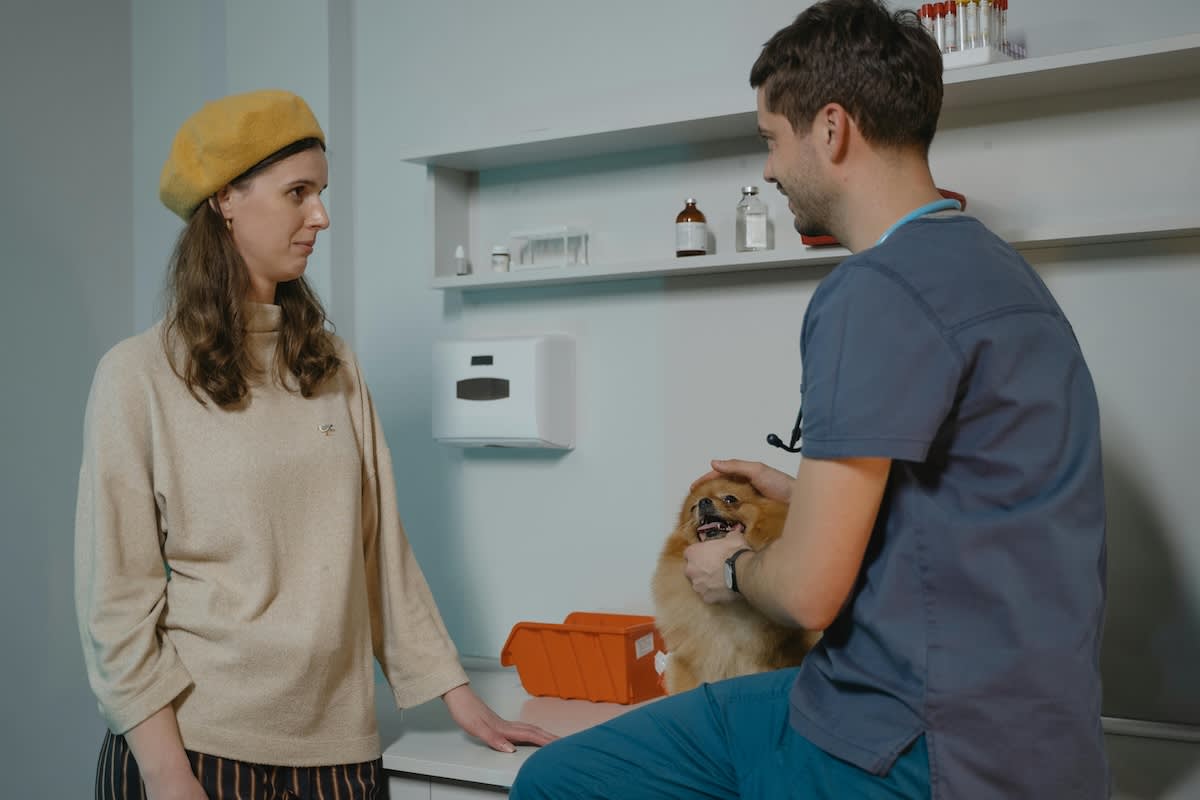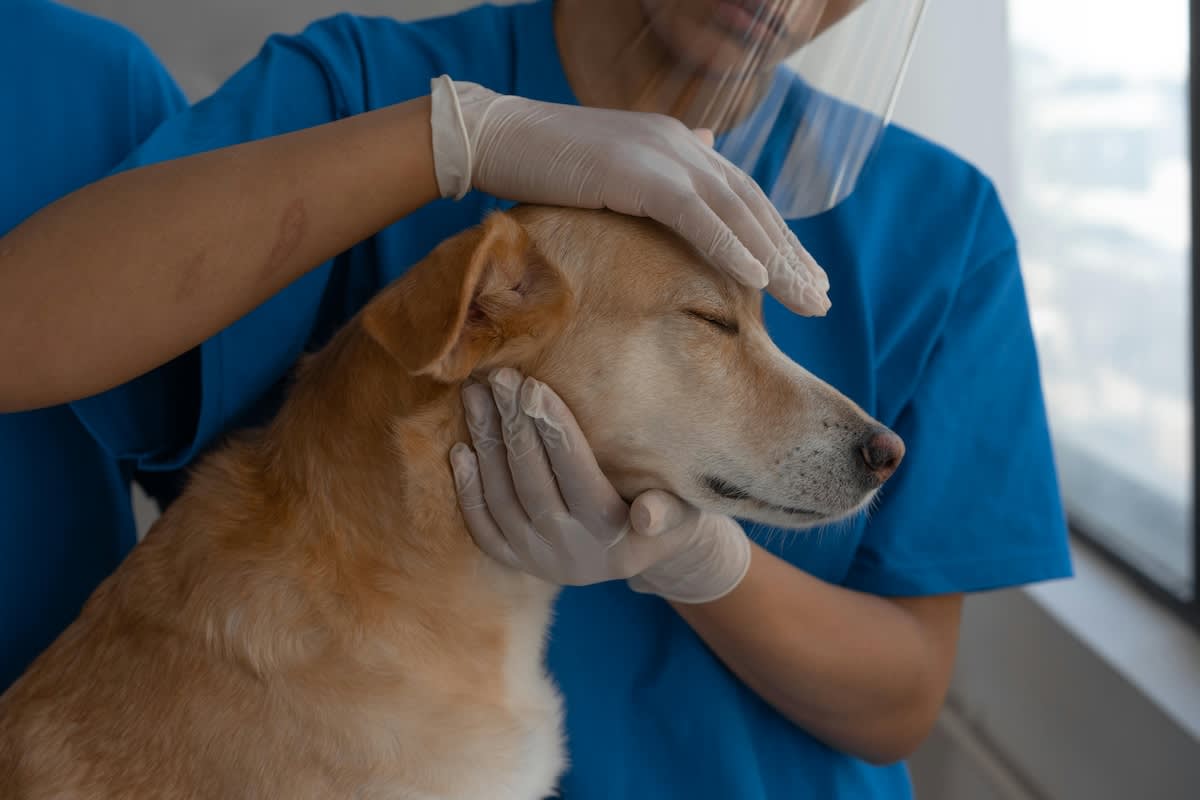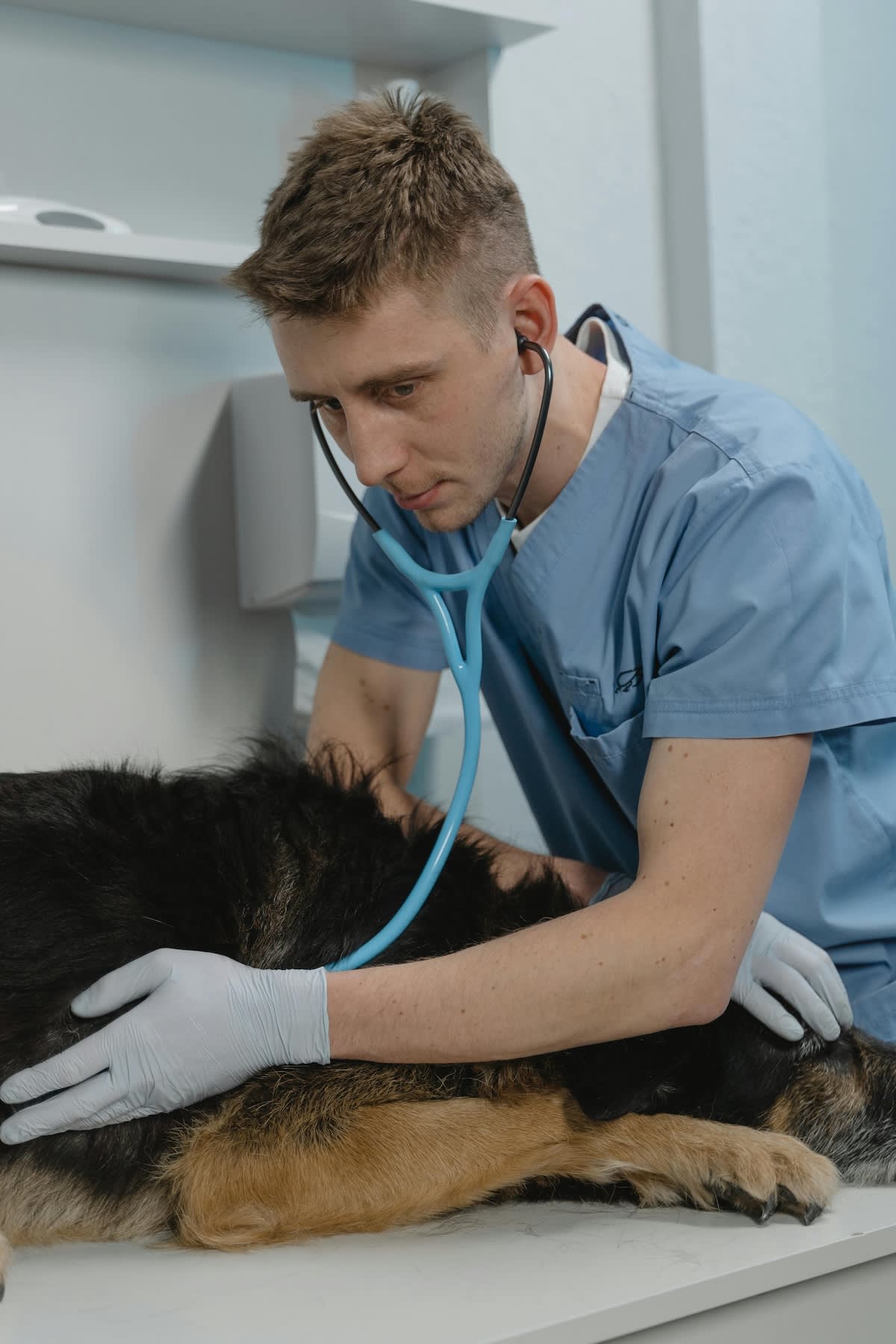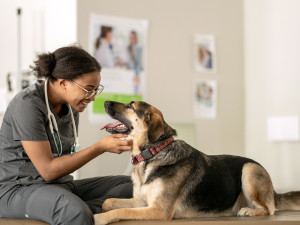9 Reasons Not To Sleep On Regular Vet Check-Ups
10% of pet parents won't get their dogs regular check-ups – here’s why that‘s a mistake.
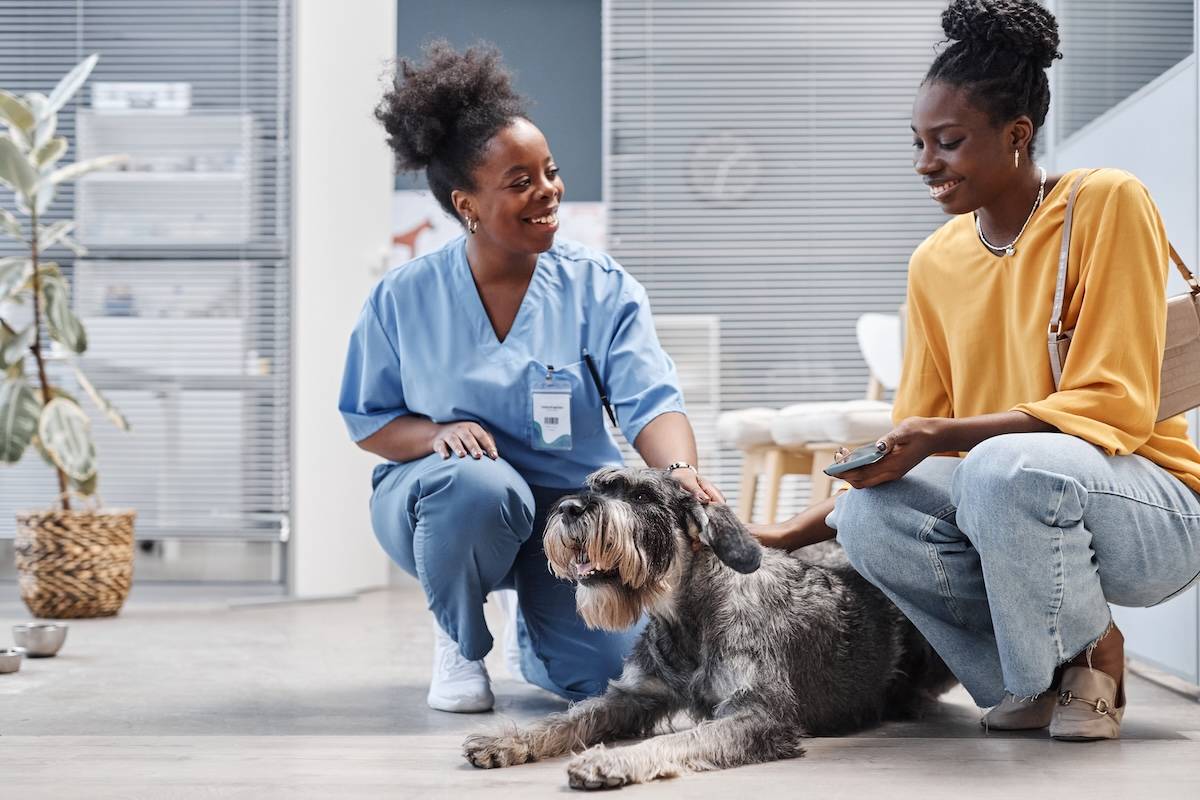
Share Article
We all have the best intentions when it comes to booking regular health check-ups – for ourselves and our pets. But let’s be honest: who hasn’t postponed an appointment once… or five times, until it quietly disappeared off the to-do list?
Unfortunately, it’s really common for pet check-ups to fall by the wayside because life gets busy and other things take priority. And if your dog seems perfectly fine, it can feel like no big deal to delay. But regular vet visits are far from just routine admin – they’re an essential part of keeping your dog happy and healthy long term.
Here’s some of the things an annual check-up might spot and why that annual vet appointment deserves a spot at the top of your calendar.
Gradual changes not seen at home
Some health issues creep in so gradually that we don’t even spot them. Stiffness, for example, can develop so slowly that your dog just adjusts to it – and you get used to their new ‘normal’.
Unlike a sudden limp, a slow ache or joint discomfort might go unnoticed. But your vet will be trained to spot these subtle changes. They’ll watch how your dog moves around the exam room, feel for any signs of pain or swelling, and ask the right questions to build a clearer picture.
This is especially important for older dogs. As they age, arthritic changes are really common, and regular check-ups mean you can catch them early and get the right support in place – whether that’s joint supplements, pain relief or lifestyle tweaks.
A proper look at their teeth
Dental health isn’t just a human problem – your dog’s teeth and gums need attention, too. And unless your dog is unusually chill about having their teeth brushed, chances are you don’t get much of a look inside their mouth.
Vets will check under the lips and tongue, looking for any signs of dental disease, lesions or unusual growths. They’ll also check your dog’s gum colour, which can actually reveal quite a bit about their cardiovascular health. It’s not the most glamorous part of the check-up, but it’s definitely one of the most important.
Heart and lung checks
Your dog’s annual check is also the time your vet will listen to their heart and lungs using a stethoscope (auscultation). They’re trained to detect even the slightest abnormalities – things you’d never pick up on at home.
Conditions like congestive heart failure often start quietly, but they can be caught earlier during these routine checks. The earlier you know about it, the sooner treatment can begin, which can make a big difference to your dog’s comfort and quality of life.
Subtle weight and muscle changes
Another thing that’s hard to spot when you see your dog every day? Gradual weight loss or gain and muscle wasting.
Muscle loss in certain areas (known as cachexia) can point to underlying issues like heart disease, kidney problems or even cancer. And while there’s also natural age-related muscle loss (called sarcopenia), a trained vet will be able to tell the difference.
Even if your dog’s weight seems steady, having a record of their usual range helps to catch any big changes early. Sudden weight gain or loss could be a red flag – and your vet can help get to the bottom of it.
Ear examinations
Did you know dogs have both a vertical and horizontal canal in their ears? This means that while surface-level infections might be visible, there could be deeper issues hiding further in – ones only a vet can properly check for using an otoscope.
If your dog’s been shaking their head or if you’ve noticed a strange smell coming from their ears, bring it up during the appointment. It’s much better to catch something early before it becomes painful, especially if your pup is prone to ear problems.
Medications and parasite protection
Since September 2023, new rules from the Royal College of Veterinary Surgeons (RCVS) mean vets need to perform a physical exam before prescribing certain medications, including things like flea and worm treatments.
That means if you’ve skipped your regular check-up, you might need to book a last-minute appointment just to get your parasite protection. These treatments aren’t optional – they’re essential for preventing some pretty nasty infestations.
Skin, lumps and bumps
Dry skin, itching or constant paw licking? These can be early signs of allergies or dermatitis – and your vet can help work out what’s going on. During the check-up, they’ll ask questions about scratching, chewing or any hot spots, and take a closer look.
It’s also the perfect time to get any lumps and bumps checked. Even if they’ve been there a while, it’s worth monitoring for changes in size or shape. Your vet can help assess whether they’re harmless or something that needs investigating further.
A chance to ask questions
Ever noticed something odd with your dog and thought, “I’ll ask the vet next time”? And then immediately forgot? You’re not alone.
Use the annual check-up as your chance to ask all those little questions you’ve been saving up. Even better – write them down or take a quick video when something seems off. Vets love a good visual aid, and it’ll help them give you clearer advice.
Whether it’s questions about behaviour, food, supplements or home care – this is the moment to ask.
It might be required for your insurance policy
Here’s something many dog parents don’t realise: some pet insurance policies require regular check-ups in order to stay valid – especially when it comes to dental cover or ongoing conditions.
If your insurer finds that you skipped a routine exam, they could reject a future claim. Not ideal, especially when vet bills can add up fast. So take a few minutes to check your policy wording, just in case.
It’s worth the time
As you can see, those regular vet visits aren’t just about ticking a box, they’re a genuinely valuable opportunity to catch problems early, manage ongoing care and keep everything on track (including your insurance cover and prescriptions).
Some vet practices even offer health plans that include annual check-ups and boosters at a discounted rate, so it’s worth asking your clinic what’s available.
Ultimately, this is one of the best things you can do for your dog’s long-term well-being. So if it’s been a while, take this as your sign to book that appointment. Future you – and your dog – will thank you.
References
Cole, Lynette K. “Anatomy and Physiology of the Canine Ear.”opens in new tab Veterinary Dermatology, vol.
20, no. 5-6, Oct. 2009, pp. 412–21.Freeman, L. M. “Cachexia and Sarcopenia: Emerging Syndromes of Importance in Dogs and
Cats.opens in new tab” Journal of Veterinary Internal Medicine, vol. 26, no. 1, Wiley, Nov. 2011, pp. 3–17.THE IMPORTANCE OF CLINICAL EXAMINATION FOR THE DIAGNOSIS
OF HEART DISEASE AND LEFT CONGESTIVE HEART FAILURE SYNDROME IN DOGS
AND CATS-A REVIEW; Scientific Works. Series C, Veterinary Medicineopens in new tab 70.2 (2024).“‘Under Care’ - Guidance.” Professionals, 2025opens in new tab
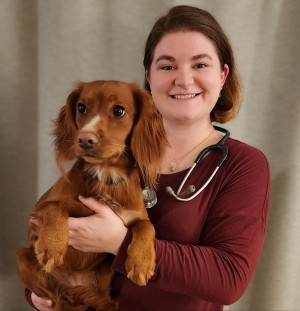
Dr Josephine Corrick, BVMSci, BSc, MRCVS
Dr Josephine Corrick, BVMSci, BSc, MRCVS is a veterinary surgeon based in the south of Scotland where she has been since graduating from the University of Surrey. She enjoys working in general practice treating small animals. Her particular interests include diagnostic imaging and the treatment of wildlife.
Having found a passion for veterinary medicine after doing a degree in Equine Sports Science she still enjoys including horses in her life by spending time with her highland ponies. Alongside her clinical work, she helps run a smallholding caring for rare breed sheep and exploring the Scottish countryside with her young Cocker Spaniel.
Related articles
![cat and dog laying on bed together]()
What’s the Deal With Pet Insurance?
It covers your pet so you can get that broken leg fixed – while keeping your wallet happy
![vet smiling at dog]()
A Vet Explains How To Keep Your Pet’s Medical Bills Low This Winter
As a vet working in emergency practice, I often see cases where these bills could be reduced or avoided altogether
![French bulldog puppy looking scared at vet]()
10 Things to Ask At Your First Vet Visit
There are no stupid questions when it comes to your dog’s health
![Smiling veterinarian examining medical documents of a Bulldog standing on her examination table]()
10 Tips to Give Your Dog a Blissful Vet Visit
Reduce the stress of vet visits – for you and your pup

